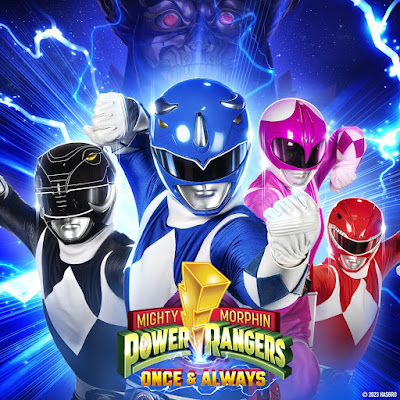In a world afflicted by chronic nostalgitis, only one team of heroes can defeat humankind's mortal enemy... again
The 30th anniversary special episode Power Rangers: Once & Always is a fairly standard Baddie of the Week plot that succeeds at summarizing the show's formula for the ages: enemy shows up, new hero is recruited, big robots fight, enemy explodes, the end. Why fix what ain't broken? My generation ate it up for (at least) 145 episodes and a movie before the first change of costumes, and we loved it. The Power Rangers franchise is now on its 29th season, healthy and well, and, although it has nowhere near the budget or the public presence of the bigger superhero properties, it shows no signs of decline. We may very well go on to have more Power Rangers for another three decades.
Given the show's uninterrupted existence, its part in this century's plague of nostalgic legacyquels has a very different effect compared to productions that were canceled at some point and revived. Power Rangers already has an established tradition of bringing past heroes back for reunion episodes. The franchise embraces the motto "once a Ranger, always a Ranger" in a way that keeps old stars alive in fans' memory. Of course, Once & Always doesn't fit in the present continuity, but that's also true of numerous teamups where previously depowered heroes somehow come back to save the world one (additional) last time.
What sets Once & Always apart from other reunion episodes is that it's focused entirely on the original cast, the team remembered by the first generation of viewers, which allows the plot to offer those now older viewers a more violent and lethal adventure than do current seasons. As an homage to the late and dearly remembered actress Thuy Trang, who played the original Yellow Ranger Trini Kwan in seasons 1 and 2, the story focuses on the team's grief over the loss of their sister-in-arms. The opening of this episode implies that Trini Kwan returned to the team and continued having adventures into her mid-40s, but the character is never shown out of her superheroine suit. The same treatment is used with the Pink, Red, and Green Rangers, who are only seen in costume because their original actors didn't join the production (Amy Jo Johnson declined to reprise her role, Austin St. John is dealing with legal trouble over charges of financial fraud, and Jason David Frank took his life last year).
That leaves us with only two returning heroes from the original team: David Yost as the Blue Ranger and Walter Jones as the Black Ranger (along with fellow stars Steve Cardenas as the second Red Ranger and Catherine Sutherland as the second Pink Ranger, plus Johnny Yong Bosch and Karan Ashley in minor supporting roles). In this adventure, the Power Rangers must reassemble after a botched attempt to revive their mentor Zordon causes the return of their first enemy, Rita Repulsa, who starts capturing multiple teams of Power Rangers across the world to fuel a time machine she plans to use to ensure her past self's victory before the first team is ever recruited. During the crisis unleashed by Rita, Trini's daughter Minh assumes the mantle of the Yellow Ranger, avenges her mother, and helps save the world.
Let's forget for a moment that such a reunion shouldn't even be possible (the dinozords were destroyed by second-season villain Lord Zedd, the Green Ranger was permanently depowered shortly thereafter, the dino power coins were destroyed by third-season villain Rito Revolto, and the second Pink Ranger never had dino powers). None of that matters for the purposes of this story. This is not a continuation of the 90s show, but a celebration of a generational milestone. Of all the nostalgia grabs that inundate us these days, Once & Always is the least cynical. It never pretends that the show was anything more sophisticated than a corny campfest with facile moralizing and barely passable acting. What matters to the viewers of my generation is that it was our corny campfest with facile moralizing and barely passable acting.
The charm of Power Rangers has always rested on its sincere use and reuse of very flat archetypes. When I was an unremarkable awkward nerd, the Blue Ranger taught me that the unremarkable awkward nerd could be best friends with the hypermuscular jock dude and with the fashionable valley girl plus pilot a robot dinosaur to kick butt with plus save the world in time to run home and finish homework. These characters connected with my life in a way that Goku and Wolverine could never hope to. Years later, when I learned that the Blue Ranger actor David Yost was queer, I felt an even closer link to the character. To this day, my phone is set to play the Power Rangers communicator beep tune when it gets a text message. It's hard to believe that this extremely simple, repeatable, color-coded story has been with me for 30 years now, but its basic format still moves me. While acknowledging all the problematic implications of putting child soldiers in front of magical warlords (and the crushing blow to a teenager's self-esteem that is to watch a bulked-up twenty-something play a high schooler), I'll still gawk at the comically huge rayguns, the impractical poses, and the contortionist robots. That's the significance of this anniversary episode. These are the characters who taught my generation about goodness and bravery. These are the characters I filled notebooks of atrociously drawn fanfic with. These are my heroes. Once and always.
Nerd Coefficient: 6/10.
POSTED BY: Arturo Serrano, multiclass Trekkie/Whovian/Moonie, accumulating experience points for still more obsessions.
